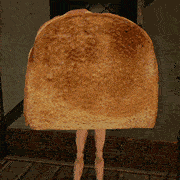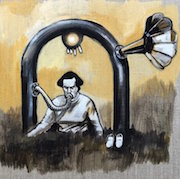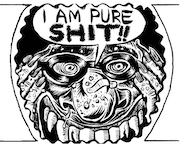|
Mein Kampf was published in 1925
|
|
|
|

|
| # ? May 10, 2024 06:56 |
|
Tree Goat posted:Mein Kampf was published in 1925 That's nonfiction.
|
|
|
|
i would also like to point out that i made this post:Tree Goat posted:marginalia and commonplace books are some of the most fascinating and intimate artifacts great authors leave behind. thinking of books as sacred and immutable texts is to alienate yourself from the joys of both writing and reading. so i agree with the consensus that goons should not make them, so we do not burden future generations with "what if the two main characters were vampires, and kissed each other?" and "proust, so far, is entirely consistent with the wh40k universe." weeks before this one: Crashbee posted:So we're going from an Englishman in historical Italy to an Englishman in historical India? I like it. and so the demiurge is real and we live in a remote echo of reality, impossibly far from the Divine
|
|
|
Nanomashoes posted:That's nonfiction.
|
|
|
|
|
Tree Goat posted:i would also like to point out that i made this post: hahahha
|
|
|
|
anilEhilated posted:I thought it was fantasy.
|
|
|
|
Tree Goat posted:i would also like to point out that i made this post: also I just changed m y Steam name to "Foucault's Frenulum" and not enough ppl find it funny
|
|
|
|
Nanomashoes posted:That's nonfiction. He was just confusing it with Tom Wolfe's novelization, The Reich Stuff.
|
|
|
|
mallamp posted:First book is awesome but after that the characters began to piss me off. French assholes spending all their days coming up with 'witty' things to say at dinner (saying random word in English midsentence counts as witty) wasn't my thing, but sure, the prose is great. Also Marcel is so uberbeta it's not even funny after a while. It should be favorite book of animegeeks, they should also long the lost world Marcel longs for, where he can asperger all day long in peace while plebeians serve him hello it's me the uberbeta animegeek that longs the lost long asperger world of In Search of Lost Time or something
|
|
|
|
I read Colorless Tsukuru Tazaki and His Years of Pilgrimage and now I want to discuss translation. I was thinking in a philosophical sense, can you really translate a work? If you write the same sentence in two different languages, is it really the same? It probably has different emphasis that you can't necessarily control. I'm not knocking the English translation or anything, I think they did the best they could without say, footnotes or endnotes, when you have to share what kanji names use because colors are important and when there's a part where Tsukuru reflects on pronoun usage. There's a part where they discuss "Le mal du pays" and talk about how while it's typically translated as "homesickness" or "melancholy" that it means more than that (I don't know French. They could be bullshitting.) It sort of made me feel like this was "Try to Translate this" the book. What are your thoughts on translating books?
|
|
|
|
Murakami collaborates with his translator a lot and his style itself was born by writing (bad) English and translating it back to Japan to make sort of poor mans Hemingway language, it's not that hard to translate. I like translations, as long as you remember translations are always interpretations. I think great translator should even subtly improve the text, to make it worthwhile vs. quick course and google translatorButt Frosted Cake posted:hello it's me the uberbeta animegeek that longs the lost long asperger world of In Search of Lost Time or something Cool Better than manga huh mallamp fucked around with this message at 16:51 on Apr 10, 2016 |
|
|
|
I don't think in a "philosophical" sense you can "translate" a book, you simply interpret it, and the works have to compared on their own, different merits; but people overestimate their comprehension of the nuances and significance of language. No one digs into the meaning of every single word choice.
|
|
|
|
Translations are cool because I don't want to have to learn every language to read every book.
|
|
|
|
Nanomashoes posted:Translations are cool because I don't want to have to learn every language to read every book. Oh believe me, I get that. I do. I don't mean it in the elitist sense like "You haven't truly read it unless you read it in the superior Nihongo, scrub," I just sort of wonder because there were some parts of the book that were really jarring that I imagine worked better in Japanese. I mean, parts about using ore and omae probably are a lot less "what the hell is this" to the reader if you know Japanese, you know what I mean? I got the impression Murakami books typically aren't a problem to translate (I cannot remember where I got this idea), and then I read this one, and just really wondered about it. I guess in some sense, what I'm saying is, if I were to get good at Japanese and read this in Japanese, I would regard it as a different work I think. Caustic Chimera fucked around with this message at 17:27 on Apr 10, 2016 |
|
|
|
Caustic Chimera posted:Oh believe me, I get that. I do. I don't mean it in the elitist sense like "You haven't truly read it unless you read it in the superior Nihongo, scrub," I just sort of wonder because there were some parts of the book that were really jarring that I imagine worked better in Japanese. I mean, parts about using ore and omae probably are a lot less "what the hell is this" to the reader if you know Japanese, you know what I mean? I mean, if you want a satisfying answer to that question you pretty much gotta learn Japanese and find out.
|
|
|
|

|
|
|
|
wtf is the point of keeping the line breaks if you don't have any metre or rhyming ffs
|
|
|
|
YOu cannot, and should not, translate a book.
|
|
|
|
Dante got sassy wow "You don't look well old man" "Lead me the gently caress out of here, dude" "Sure, I'll look at this stuff you're talking about, whatever it is."
|
|
|
|
Did he check his UPGRADES menu before he got out of that depressing darkness?
|
|
|
|
mallamp posted:Cool Uh sure? If you want illustrations to go with Proust you can buy that art book with every painting he references.
|
|
|
|
Translating poetry is usually bad idea Except when it's ancient/medieval poems and they're turned into prose in process, that's sweet
|
|
|
|
ni devus traduki ĉion en esperanto. esperanto estas la universala lingvo
|
|
|
|
When I was reading Lu Xun's stories, there was a reference (or maybe multiple references?) to teaching Esperanto. I had to look it up and was surprised there was ever a time Esperanto was taken seriously. But it will foster peace. Let us unify. Pacon!
|
|
|
|
gently caress you right in the neck for making me aware of this
|
|
|
|
Tree Goat posted:ni devus traduki ĉion en esperanto. esperanto estas la universala lingvo https://www.youtube.com/watch?v=_7QNuIt24cY
|
|
|
|
My very scientific calculations have shown that 95% of prose loses at most 5-10% of its value in translation. if the translator is less tone-deaf than the author, it can even read better. there's a ton of lovely translations out there, too, but if you trust the person who did it, there's no point in avoiding a book just because it's a translation. I'd argue that you get 'more' out of a well translated book than you would in reading it in the original language if you're not entirely fluent in it. you might miss the class and style markers, archaisms, etc. that prose often (always) has, whereas a good translator often can find an analogue in your language. on the other hand, an 'average' trnaslation might have an effect of flattening the prose, evening out the intentional bumps in style. it's not only hte translator's fault, because often the editor and/or publisher get involved and they might have an aversion to 'coarse' language or working class markers. then it's up to you to decide if that's a hill you're willing to die on.
|
|
|
|
Translating tone is super tricky tho; I think most people nowadays would agree that it's not a good idea to make the Anatolian shepherds of your translation speak like 1800s minstrel show characters, even if the reader might miss out on some of the implications of their folksy wisdom. So the flattening can be comparatively desirable.
|
|
|
|
It is, but I'd argue that in majority of cases getting the tone right in your language is doable, even if the fidelity, of course, won't be 100%. While there is a danger of overdoing it, I think it is very important for the translation to reflect the different tones in the original text. like, in the Anatolian shepherds' case (assuming it wasn't ovedone in the original for a comic or xenophobic effect), you would probably use language with less recent borrowings, if their speech in the original isn't marked as very different, or maybe use a local dialect of your own language if their speech has enough differences from the 'literary norm'. one of the most celebrated recent poetry translations in Latvia were done of Heli Laaksonen's poems, which were written in a Finnish dialect originally. The translator used a Latvian dialect from the region bordering with Estonia (or even a mixture of dialects) to do the poems, and it's come out very well, I think. In this case, sure, the translator is doing more interpreting than straightforward translation - but the ability to do that well is one of the differences between a good translator and a great one, I'd say.
|
|
|
|
Burning Rain posted:It is, but I'd argue that in majority of cases getting the tone right in your language is doable, even if the fidelity, of course, won't be 100%. While there is a danger of overdoing it, I think it is very important for the translation to reflect the different tones in the original text. like, in the Anatolian shepherds' case (assuming it wasn't ovedone in the original for a comic or xenophobic effect), you would probably use language with less recent borrowings, if their speech in the original isn't marked as very different, or maybe use a local dialect of your own language if their speech has enough differences from the 'literary norm'. Sure, but I think... Like, this is a real test of the translator's skills: how to do it without stumbling on some completely arbitrary connotations. Every dialect has its reputation, and that sort of mixing and matching is really tricky. So the decision of choosing a local dialect for your translation has to be weighed really carefully. I think more often you see vaguely older or newer or more and less formal slang and vocabulary used, and even then there's got to be a reason for that - you shouldn't give a character and unintended comical edge just because they're from a different city than the protagonist. But yeah I broadly agree with you, I just think that there's some real strong ideals and then there's practice: the translator is supposed to disguise themselves. quote:one of the most celebrated recent poetry translations in Latvia were done of Heli Laaksonen's poems, which were written in a Finnish dialect originally. The translator used a Latvian dialect from the region bordering with Estonia (or even a mixture of dialects) to do the poems, and it's come out very well, I think. In this case, sure, the translator is doing more interpreting than straightforward translation - but the ability to do that well is one of the differences between a good translator and a great one, I'd say. Interesting. If you wanna get technical, you might note that Laaksonen's Southwest Finnish dialect is pretty much the closest modern dialect to Estonian, so there's a very careful choice of tone there. Which is admirable I guess. I've gently caress all interest in poetry, Southwest Finnish, Southwest Finland or Heli Laaksonen tho.
|
|
|
|
I was talking to my Romanian friend about Huck Finn and she'd read it in translation and didn't like it. I was talking about the dialect and she didn't really know anything about it. I showed the English version and she was surprised. It's gotta be so hard to translate things like that.
|
|
|
|
I want to become scholar of southwest finnish poetry
|
|
|
|
The new Caroline Alexander translation of The Iliad is $.99 on Amazon today--anyone read this version? I've never read The Iliad before, but it looks like a good one...
|
|
|
|
|
|
|
|
I'm constantly torn.. I kind of want to quit literature and become fulltime nerdlord, but reading and studying literature has ruined lesser hobbies. Now I'm bored whatever I do. And I understand why stereotypical lit professors are depressed
|
|
|
|
Maybe I should interact with human beings but that's boring aswell and also awkward
|
|
|
|
I just finished The New Tales of Tono by Hisashi Inoue and it might have been the best tall tale I've ever read. Some context for this: The original The Legends of Tono are strange mixture of folktales and everyday mysteries written by a guy named Kunio Yanagita around 1910. Because he basically started Japanese folklore studies this work is often compared to the Grimms' Fairy Tales but most of the stories from Tono are just anecdotes about weird occurences. However like the Grimms, he changed tone and content of the stories as he saw fit (his informant, Saski Kizen, was trying to become a write and was also interested in folklore studies, their relationship was kind of exploitative). Moreover, Yanagita had his own agenda, trying to find a core of "Japaneseness" in these stories (he had some peculiar ideas, like he imagined there to be ur-Japanese mountain people who gave the emperor legitimacy by connecting him to some essence of Japneseness). All of this might explain why The Legends of Tono seem so lacking in humorous and erotic elements and feel unrelatable and ripped from context. I think he wanted them to appear more mysterious, hinting at a deeper meaning. The New Tales of Tono can be seen as an attempt to put these legends back into their natural habitat as told by a storyteller, a task at which Inoue succeeds masterfully. He cites The Legends of Tono when needed and the introduction is quite good, so you don't need to read the original to enjoy this. But if you are interested in this kind of thing I recommend you read both. It certainly gave me a new perspective on stories that were originally orally transmitted.
|
|
|
|
mallamp posted:Maybe I should interact with human beings but that's boring aswell and also awkward Unlike your posts?
|
|
|
|
Cloks posted:Unlike your posts? Do you think I'd be posting here if I was interesting person with interesting life, come on
|
|
|
|

|
| # ? May 10, 2024 06:56 |
|
Guys, you should read The Shore by Sara Taylor. It's this book of interconnected stories (I'm beginning to think I like this type very much. Recommend me some) with this place as the setting. It jumps back and forth in time, and is centered around these two families. It's a pretty dark book, showing the uglier side of people, but it's a really compelling read. Read it.
|
|
|

























